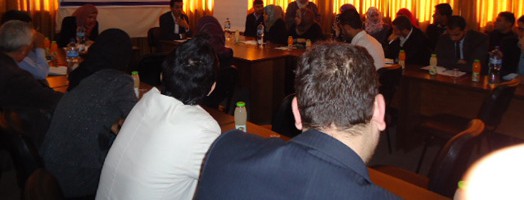Public Freedoms in the Palestinian National Authority-Controlled Territory
On 13 December 2011, the Institute of Law (IoL) at Birzeit University organised a legal encounter on the Public Freedoms in the Palestinian National Authority-Controlled Territory. Delivered by Mr. Salah Abdul ‘Ati, Director of the Northern Gaza Office of the Palestinian Independent Commission for Human Rights, the encounter brought together a considerable number of lawyers, law students and representatives of relevant institutions.
In her opening remarks, Mrs. Lina at Tounisi, Coordinator of the IoL Gaza Office, welcomed the speaker and audience and made a briefing note about the Birzeit Legal Encounters programme.
Mr. Abdul ‘Ati presented an overview of public freedoms enshrined in national regulations and international conventions. These include the right to freedom of expression and opinion, right to peaceful assembly, right to freedom of association, right to public service, freedom of access and movement, and freedom of worship. Mr. Abdul ‘Ati expalined that public freedoms are of paramount significance in the International Bill of Human Rights, especially the International Covenant on Civil and Political Rights.
The right to freedom of expression and opinion is an indispensable component of democratic political systems. It is an inalienable, fundamental human right and major civil liberty. Without being subject to censorship or authoritarian restrictions, this right is grounded on the freedom to seek, receive and impart information and ideas of all kinds, regardless of frontiers, either orally, in writing or in print, in the form of art, or through any other media.
Article 26(5) under the Palestinian Amended Basic Law of 2003 safeguards the right to peaceful assembly. Safeguarding this right, Article 4 under the Law of Public Assembly No. (12) of 1998 provides that a written notice, that is signed by at least three persons who organise an assembly, shall be submitted, stating the place and time at which the assembly will be held and the purpose thereof.
The right to freedom of association is also enshrined in international conventions on human rights. Article 22(1) and (2) under the International Covenant on Civil and Political Rights provides that “[e]veryone shall have the right to freedom of association with others, including the right to form and join trade unions for the protection of his interests. No restrictions may be placed on the exercise of this right other than those which are prescribed by law”.
Mr. Abdul ‘Ati elaborated on conditions to be met for occupying public positions. Article 24 under the Law of Civil Service of 1998 and its Amendments list terms and conditions of civil servants. A civil servant should be a Palestinian or Arab national; be 18 years of age; and be free of physical or mental diseases or disabilities that prevent him from performing functions of the service in which he will be appointed.
Under national and international regulations, liberty of movement is a personal right that may not be seized or subjected to restrictions without strong legal justifications. This ensures a person’s right to movement from one place to another and to freedom to leave any country, including his own.
According to Article 18(1) under the International Covenant on Civil and Political Rights, “[e]veryone shall have the right to freedom of thought, conscience and religion. This right shall include freedom to have or to adopt a religion or belief of his choice, and freedom, either individually or in community with others and in public or private, to manifest his religion or belief in worship, observance, practice and teaching.”
Mr. Abdul ‘Ati concluded that the current Palestinian political situation has negatively impacted freedom of the press, paving the way to violations and aggressions on journalists and media outlets. In the context of counter measures, media representatives have been subject to restrictions in the Gaza Strip and West Bank. As a result, citizens have been deprived of their right to free access to objective information.
Journalists have further avoided sensitive news stories, reflecting a general decline of media freedom and activity. Mr. Abdul ‘Atil stressed that freedom of the press should be respected. Protection and all necessary facilities should be provided to media representatives so that they exercise their profession freely. To help journalists, citizens and associations exercise the right to freedom of expression, the barrier of self-censorship should be removed.
In the ensuing discussion, lawyers and law students made significant interventions and raised questions that reflected their awareness and interest in the topic. Also calling to hold responsible authorities to account, discussants highlighted infringements on public parades and demonstrations in the West Bank and Gaza Strip and violation of the right to freedom of association.
Finally, Mrs. at Tounisi expressed thanks and gratitude of both IoL and Birzeit University to the speaker and audience for their effective participation and debate in the legal encounter.
The legal encounter was organised in partnership with the Konrad Adenauer Stiftung.











